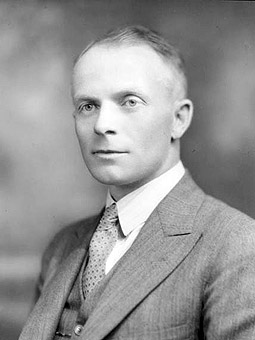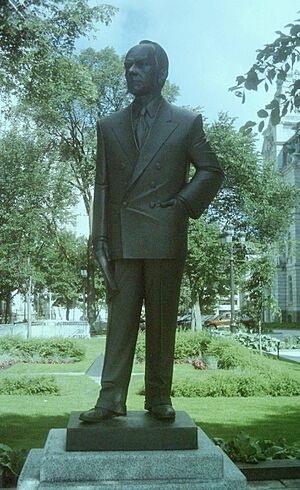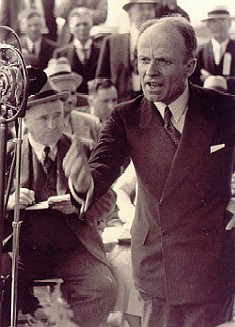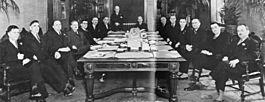Adélard Godbout facts for kids
Quick facts for kids
Adélard Godbout
|
|
|---|---|

Godbout, c. 1932
|
|
| 15th Premier of Quebec | |
| In office November 8, 1939 – August 30, 1944 |
|
| Monarch | George VI |
| Lieutenant Governor | Ésioff-Léon Patenaude Eugène Fiset |
| Preceded by | Maurice Duplessis |
| Succeeded by | Maurice Duplessis |
| In office June 11, 1936 – August 28, 1936 |
|
| Monarch | Edward VIII |
| Lieutenant Governor | Ésioff-Léon Patenaude |
| Preceded by | Louis-A. Taschereau |
| Succeeded by | Maurice Duplessis |
| Senator for Montarville, Quebec | |
| In office June 25, 1949 – September 18, 1956 |
|
| Appointed by | Louis St. Laurent |
| Preceded by | Charles-Philippe Beaubien |
| Succeeded by | Henri Charles Bois |
| MNA for L'Islet | |
| In office October 25, 1939 – July 28, 1948 |
|
| Preceded by | Joseph Bilodeau |
| Succeeded by | Fernand Lizotte |
| In office May 13, 1929 – August 17, 1936 |
|
| Preceded by | Élisée Theriault |
| Succeeded by | Joseph Bilodeau |
| Personal details | |
| Born |
Joseph-Adélard Godbout
September 24, 1892 Saint-Éloi, Quebec, Canada |
| Died | September 18, 1956 (aged 63) Montreal, Quebec, Canada |
| Political party | Liberal |
| Profession | Agronomist |
Joseph-Adélard Godbout (September 24, 1892 – September 18, 1956) was an important Canadian agronomist (a scientist who studies soil and crops) and politician. He served as the 15th premier of Quebec (the leader of the provincial government) twice. First, for a short time in 1936, and then again from 1939 to 1944. He was also the leader of the Parti Libéral du Québec (PLQ), which is the Liberal Party of Quebec.
Youth and Early Career
Adélard Godbout was born in Saint-Éloi, Quebec. His father, Eugène Godbout, was also an agriculturalist and a politician. Adélard studied at several schools, including an agricultural school in Sainte-Anne-de-la-Pocatière and the University of Massachusetts Amherst in the United States.
After finishing his studies, he became a teacher at the Sainte-Anne-de-la-Pocatière agricultural school from 1918 to 1930. He also worked as an agronomist for the Ministry of Agriculture from 1922 to 1925. This means he helped farmers with their crops and land.
Political Career
Becoming a Member of the Legislature
Godbout began his political journey by becoming a Member of the Legislative Assembly (MLA) for the area of L'Islet. He won a special election without anyone running against him on May 13, 1929. He was re-elected in the provincial elections of 1931 and 1935. An MLA is like a representative who helps make laws for their province.
Serving as a Cabinet Minister
In 1930, Godbout was chosen by Premier Alexandre Taschereau to join his Cabinet. He served as the Minister of Agriculture from November 27, 1930, to June 27, 1936. A Cabinet Minister is a high-ranking official who leads a specific department, like agriculture, in the government.
First Time as Premier
After the 1935 election, the leader of the Conservative Party, Maurice Duplessis, started looking into problems in the government. This led to discoveries of corruption, which was embarrassing for some Liberal politicians. Because of this, Premier Taschereau resigned on June 11, 1936.
Adélard Godbout was then asked to become the new Premier of Quebec. He accepted and became the leader of the Liberal Party. Godbout formed his first government, and an election was called for August 1936.
Even though Godbout was not involved in the scandals, his party lost badly in the 1936 election. The new Union Nationale party, led by Duplessis, won the election. Godbout's government lasted only two months, and he even lost his own seat in L'Islet. However, he remained the leader of the Liberal Party.
Second Time as Premier
World War II (1939-1945) gave Godbout a chance to make a political comeback. A provincial election was called in 1939. A federal (Canada-wide) politician named Ernest Lapointe helped Godbout's campaign. He promised voters that no one would be forced to join the army (called conscription) if they voted for the Liberals.
Godbout repeated this promise many times during the campaign. He said he would even leave his party if any French Canadian was forced to join the army against their will under a Liberal government. This promise was very important to people in Quebec.
Godbout and 69 other Liberal candidates won their seats in the legislature. Godbout formed his second government, serving as both Premier and Minister of Agriculture.
Important Changes Under Godbout
During Godbout's time as Premier, his government made many important changes. These changes helped set the stage for the Quiet Revolution later on, which brought many modern improvements to Quebec.

Here are some of his government's key accomplishments:
- Women's Right to Vote: In 1940, women in Quebec were finally given the right to vote. This was a big step forward for equality, even though some people, like Duplessis and the Catholic Church, were against it.
- Civil Service Commission: In 1943, a Civil Service Commission was created. This group helps make sure that government jobs are given out fairly, based on skill, not on who you know.
- Compulsory School Attendance: In 1943, a law was passed that made school attendance mandatory until age 14. This also made primary schools free for everyone. This meant more children could get an education.
- Labour Code: In 1944, a new Labour Code was adopted. This law helped protect workers' rights, making it easier for them to form unions and negotiate for better working conditions.
- Creation of Hydro-Québec: In 1944, the government took control of the Montreal Light, Heat & Power Company. This private company had a monopoly on gas and electricity in the Montreal area. Taking it over led to the creation of Hydro-Québec, a public company that provides electricity to Quebec.
- Support for French Culture: Godbout's government also encouraged and supported French culture and language in Quebec.
Working with the Federal Government
Because Godbout was Premier during World War II, he had to work closely with the federal government of Canada. Sometimes, this meant giving up some powers that traditionally belonged to the province. For example:
- The federal government created a nationwide unemployment insurance system in 1940.
- The federal government also took over the power to tax people's and companies' incomes. Quebec received money from the federal government in return, but it was less than what they could have collected themselves.
In 1942, Canadian voters were asked if the federal government should be allowed to break its promise about conscription. Most French-speaking people in Quebec voted against it, but most English-speaking people across Canada voted for it. Even though not many people were forced to serve, the decision to allow conscription was very unpopular in Quebec. Duplessis used this to criticize Godbout and the federal government.
Leader of the Opposition
In the 1944 provincial election, Godbout's Liberals and Duplessis' Union Nationale received a similar number of votes. However, the Union Nationale won more seats in the legislature, especially in rural areas, and formed the government. During this election, false and harmful rumors were spread about Godbout's plans, which unfortunately influenced many voters.
Godbout then became the Leader of the Opposition until the 1948 election. This means he led the main party that was not in power. In the 1948 election, the Union Nationale won by a huge margin. Godbout lost his own seat again. In 1950, he stepped down as the leader of the Liberal Party.
Serving as a Senator
In 1949, Godbout was appointed to the Senate of Canada by Prime Minister Louis St. Laurent. The Senate is the upper house of the Canadian Parliament, where senators review and approve laws. He remained a senator until his death in 1956.
His Legacy
People have different opinions about how important Godbout's work was. Some think he was not as strong a speaker as his main political rival, Duplessis.
Those who support a strong federal government in Canada believe Godbout's time as Premier was important because of the modern laws he passed.
Others, who focus on Quebec's independence, criticize him for giving up too much power to the federal government.
However, many agree that Godbout served during a very difficult time, especially with World War II happening. He made many important changes that helped Quebec become more modern.
In 2000, Godbout's nephew, filmmaker Jacques Godbout, made a film called Traître ou Patriote (Traitor or Patriot). He felt that not enough people knew about his uncle's important work as Premier.
In 2007, an old power station in Montreal was named in honour of Adélard Godbout. A sculpture of him is also there.
For his contributions to agriculture and helping rural Quebec, Mr. Godbout was recognized in the Canadian Agricultural Hall of Fame in 1962 and the Agricultural Hall of Fame of Quebec in 1992.
Elections as Party Leader
- He lost the 1936 election.
- He won the 1939 election.
- He lost the 1944 election.
- He lost the 1948 election.
See Also
 In Spanish: Adélard Godbout para niños
In Spanish: Adélard Godbout para niños
- Politics of Quebec
- Quebec general elections
- Timeline of Quebec history
| Government offices
|
||
|---|---|---|
| Preceded by Joseph-Léonide Perron (Liberal) |
Minister of Agriculture 1930–1936 |
Succeeded by Bona Dussault (Union Nationale) |
| Political offices | ||
| Preceded by Maurice Duplessis (Union Nationale) |
Leader of the Opposition in Quebec 1944–1948 |
Succeeded by George Carlyle Marler (Liberal) |
 | Jewel Prestage |
 | Ella Baker |
 | Fannie Lou Hamer |



